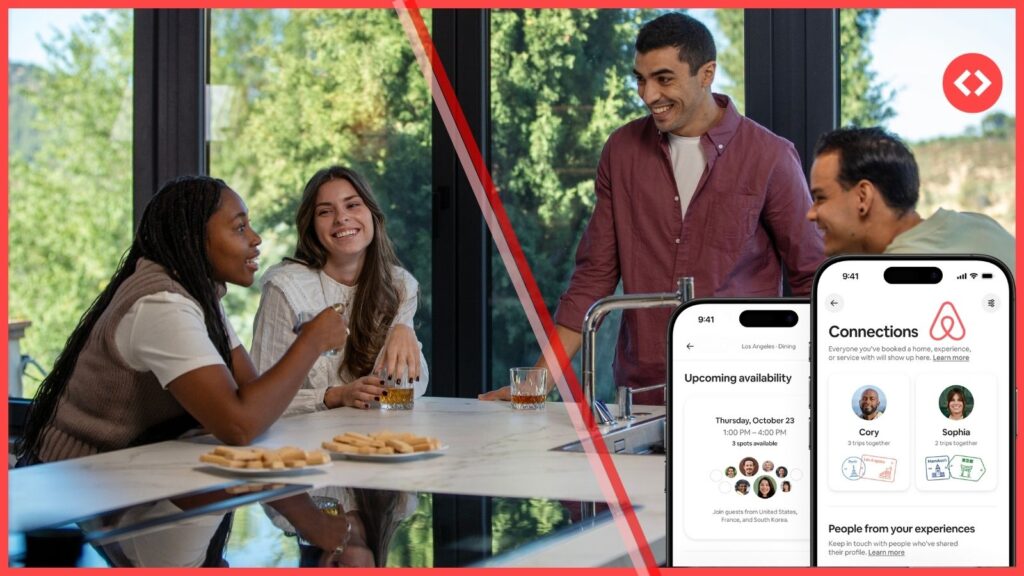Airbnb’s new Connections feature turns every booked Experience into a miniature social network. Guests can now see who else has joined an activity, message one another through the app, and stay in touch afterward.
For years, online travel was about solitude: find a stay, check out, move on. Now Airbnb is betting that what makes a trip memorable isn’t just what you do, but who you do it with.
Think of it like Strava for travelers or Letterboxd for experiences. Both platforms transformed participation into something visible and shared. Connections applies that same logic to travel: booking becomes social, and the trip becomes a shared narrative.
Airbnb Is Making Experiences Social, Not Just Transactional
Until now, Airbnb Experiences has functioned much like a booking marketplace: find an activity, pay, show up, leave a review, and move on.
The new Connections feature changes that dynamic. It turns Experiences into a social layer of travel.
- When someone joins an activity — a food tour in Lisbon, a pottery class in Kyoto, a surf lesson in Bali — they’ll automatically see a list of others who’ve booked the same slot.
- They can stay in touch afterward with people they met on a trip.
- The app displays a shared “trip history,” suggesting continuity — e.g., “Cory – 3 trips together.”
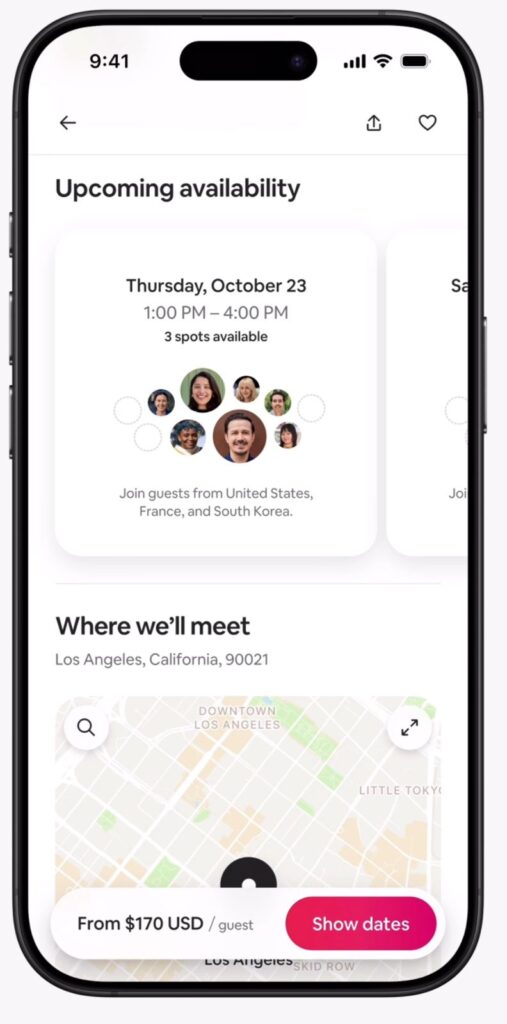
Guests can now see who else is attending an Experience before booking.
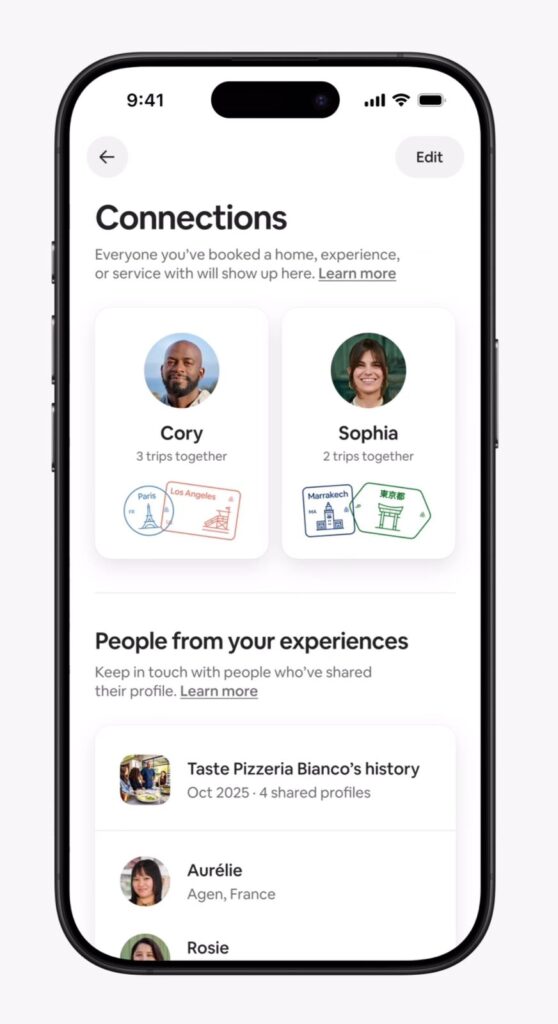
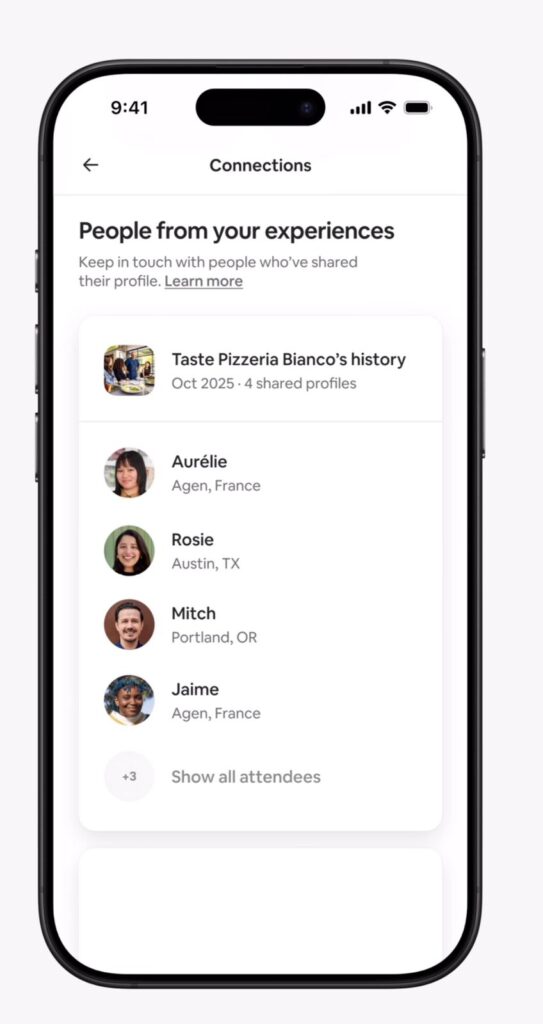
There’s no public feed, no friend requests, and no algorithmic suggestions. Airbnb designed the feature to feel personal but private, closer to exchanging numbers after a great day out than joining a social network.
This positions Airbnb Experiences less like Eventbrite or Viator (transactional booking tools) and more like a social network around travel. It blends community and commerce, a shift reminiscent of how Strava did for fitness or Letterboxd did for film.
It Extends the Airbnb Ecosystem Beyond Homes
One of Airbnb’s long-term ambitions has been to become a travel platform, not just an accommodation app. Experiences were an early attempt at that, but user engagement dropped post-COVID as people returned to booking homes more than tours.
By making Experiences social:
- Airbnb creates a reason for users to come back even after the trip is over (to message, share, reconnect).
- It adds a network effect that strengthens retention. Users who connect with others are more likely to rebook or browse new activities together.
- It creates cross-sell potential. People who form connections through an Experience might later book stays together.
Airbnb is learning to treat relationships, not reservations, as its most valuable asset. In doing so, it’s transforming from a booking platform into something closer to an ongoing travel network.
Airbnb’s Discovery Tools Are Becoming More Contextual
Alongside Connections, Airbnb has quietly reworked how travelers explore its platform.
- Improved Maps now let guests filter for nearby landmarks, attractions, and restaurants, turning local exploration into another social and contextual layer of discovery.
- Flexible Carousels broaden search results beyond rigid filters, surfacing homes in nearby cities, different price ranges, or with alternate amenities, options guests “might have otherwise missed.”
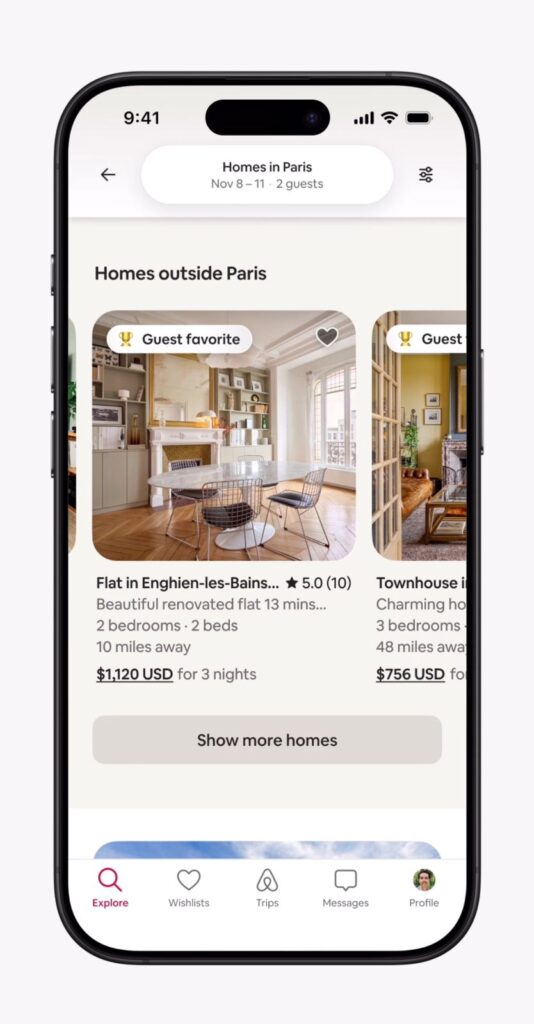
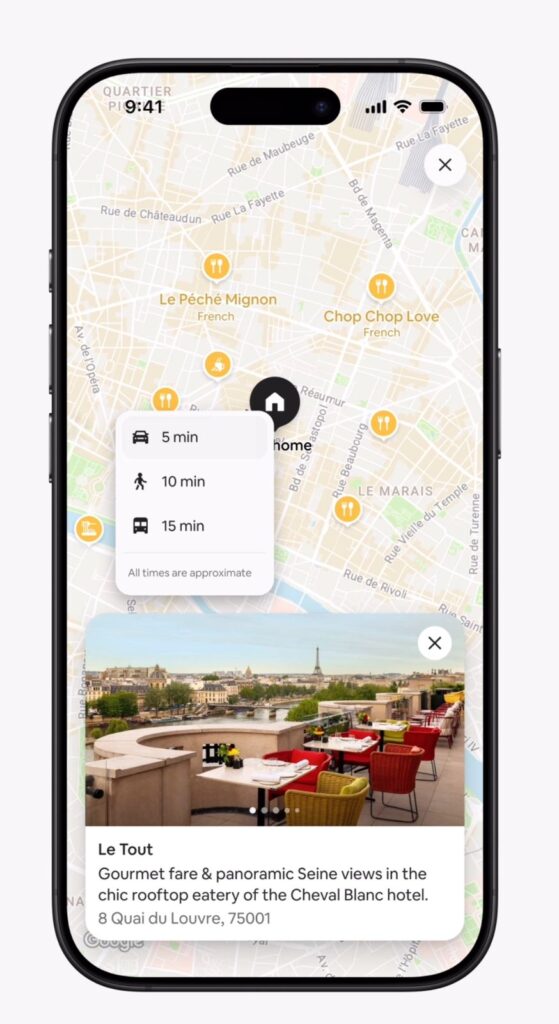
If you take all of these pieces together:
- Connections → social graph (who)
- Improved Maps → spatial graph (where)
- Flexible Carousels → predictive graph (what next)
You get the early outline of what could become Airbnb’s most ambitious system yet: a socially intelligent travel map, one that blends people, places, and experiences into an ecosystem of discoverable relationships.
It’s not just about booking a stay; it’s about seeing the web of possibilities that radiate from every trip you’ve taken and every connection you’ve made.
From Social Graphs to Smart Discovery
Behind all this sits Airbnb’s expanding use of AI-driven personalization.
Beyond what travelers search for, the platform is learning how they connect: where they go next, who they travel with, and what kinds of experiences link those patterns.
That’s how Airbnb’s discovery engine starts to move from filters to context. A couple who met on a wine tour in Portugal might later see each other’s favorite stays in Spain. A traveler who loved a cooking class in Kyoto might get shown homes near markets or local chef-led listings next time.
It’s personalization that feels intuitive, not invasive, human, not algorithmic.
It Reinforces Airbnb’s Brand Story: “Belong Anywhere”
The feature revives Airbnb’s original brand ethos: belonging through people.
During the pandemic, that message faded as Airbnb focused on safety, quality, and professionalism. Now, “Connections” revives the emotional, human narrative of Airbnb’s early identity.
It’s a smart storytelling move: positioning Airbnb as the antidote to lonely travel in a time when “social discovery” (like Bumble For Friends, or Couchsurfing nostalgia) is trending again.
The Ripple Effects: Loyalty Through Relationships
No large booking platform has ever built loyalty through relationships, but Airbnb might.
By embedding social connection into its design, Airbnb could finally create the kind of emotional loyalty that hotels and platforms have struggled to replicate. Guests may return not just for convenience or price, but because of who they met or how they felt.
For property managers, this introduces a new form of retention: encouraging guests to connect with one another, local guides, or co-host networks could become a quiet driver of repeat business. Loyalty built through shared experiences is harder to measure, and harder to lose.
The Next Logical Expansion
If Experiences are the testing ground, Stays are the next frontier.
Imagine Airbnb showing guests who else is attending a nearby festival, highlighting local hosts offering complementary experiences, or clustering listings by shared interest, digital nomads, food travelers, marathon runners.
For co-hosts and hospitality teams, this could create an entirely new layer of visibility: being not just a service provider, but a connector between travelers, properties, and communities.
This is how Airbnb shifts from platform to social infrastructure, a framework where every booking strengthens the network.
Airbnb’s Next Chapter Is About Connection
When Brian Chesky said he wanted Airbnb to become “the ultimate social network,” it sounded like another Silicon Valley metaphor, bold but abstract. With Connections, it’s becoming tangible.
This isn’t Airbnb chasing engagement for engagement’s sake. It’s the company turning years of rhetoric about “belonging” into infrastructure, one that can link travelers, hosts, and local businesses through verified experiences rather than algorithms and ads.
For professional managers, that means Airbnb’s platform is quietly changing shape. Discovery will become more relational, retention more emotional, and guest experiences more interconnected. The companies that adapt fastest, by thinking in terms of networks, partnerships, and shared community value, will be best placed to thrive in this next phase.
Uvika Wahi is the Editor at RSU by PriceLabs, where she leads news coverage and analysis for professional short-term rental managers. She writes on Airbnb, Booking.com, Vrbo, regulations, and industry trends, helping managers make informed business decisions. Uvika also presents at global industry events such as SCALE, VITUR, and Direct Booking Success Summit.

